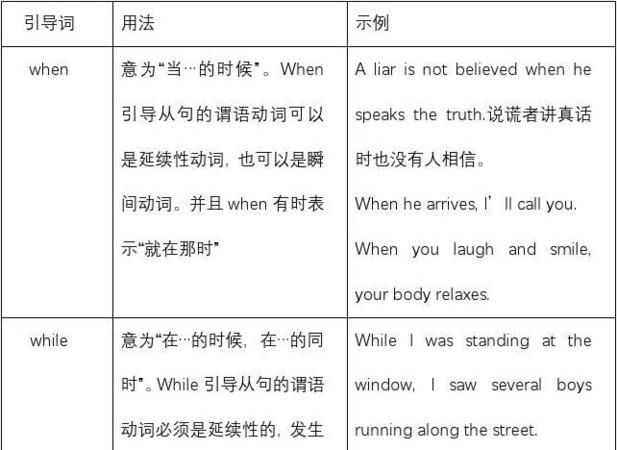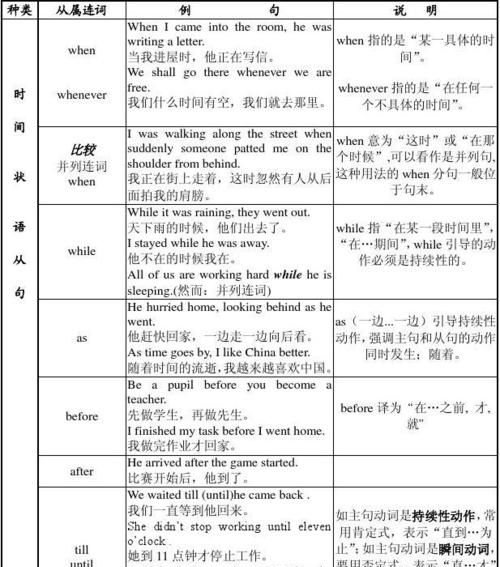本文目录
初中英语状语从句知识点归纳
一、引导方式状语从句的从属连词
主要的有as, as if, as though等:
You must do as your parents tell you. 你必须按你父母说的去做。
I have changed it as you suggest. 我已照你的建议作了改动。
I am as you can imagine short of money. 正如你能想像的我很缺钱。
Robbie didn’t feel as she did. 洛比没有她那种感觉。
They treated the child as if she were their own. 他们待这孩子像亲生的一样。
I remember the whole thing as if it happened yesterday. 整个这件事我记得很清楚,就仿佛是昨天发生似的。
【注】(1) 在非正式文体中,like也可用连词,表示方式,与as的用法相似:
Nobody loves you like I do. 没有人像我这样爱你。
She can’t cook like her mother does. 她菜做得没有她妈那样好。
(2) 有时the way 也可用作连词,表示方式,与as的用法相似:
They didn’t do it the way we do now. 那时他们不像我们现在这样行事。
I can’t help seeing things the way they do. 我禁不住也像他们那样看事物。
二、as if [as though] 从句与虚拟语气
一般说来,若as if 和as though 从句所表示的内容可能为事实,则用陈述语气,若为假设或不大可能为事实,则用虚拟语气。不过在非正式文体中,有时即使句意明确地表示不是事实,也可能用陈述语气:
He treats me as if I am [were] a stranger. 他待我有如陌生人。
The stuffed dog barks as if it is [were] a real one. 这个玩具狗叫起来像是真狗似的。
省略句知识点总结:谈谈状语从句的省略问题
【导语】 英语语法让很多学生都头疼,因为复杂难懂的句式和词组有时难以记忆。为大家整理了英语语法大全,希望对同学们的英语语法学习有所帮助。更多内容尽在。
为了简洁起见,有的状语从句(如时间状语从句、条件状语从句、方式状语从句等)有时可省略从句的主语和部分谓语(尤其是当从句主语与主句主语一致,且从句谓语包括有动词be时):
She fell asleep while (he was) doing his homework.
他在做作业时睡着了。
While (he was) doing so, he trembled a little.
他这样做时稍稍颤抖了一下。
He opened his mouth as if (he was) to speak.
他张开口,好像要说话似的。
Often she would weep when (she was) alone.
她一个人时,常常哭泣。
I’d like to see you whenever (it’s) convenient.
在你方便的时候我想来看看你。
If (you are) traveling north,you must change at Leeds.
如果你是向北行,你必须在里兹换车。
【注】有些由if构成的`省略结构,已属固定短语,如if any, if necessary, if possible, if not, if so:
There are few, if any, mistakes in that book.
那本书就是有错误也不多。
If necessary, ring me at home.
如果必要,可以打电话到我家找我。
If possible, I wish to go there next summer.
如果可能,我希望明年夏天去。
He may be busy. If so, I’ll call later. If not, can I see him now?
他可能很忙,要是这样,我以后再来拜访。要是不忙,我现在可以见他吗?
省略句知识点总结:分词作状语的主要用法
【导语】 英语语法让很多学生都头疼,因为复杂难懂的句式和词组有时难以记忆。为大家整理了英语语法大全,希望对同学们的英语语法学习有所帮助。更多内容尽在。
1. 表时间
Seeing the cat, the mouse ran off. 见到猫,老鼠就跑了。
The work finished, he went home. 工作做完后,他就回家了。
2. 表原因
Being very weak, she couldn't move. 她由于身体虚弱而不能行动。
His car broken down, he had to walk. 他的车坏了,所以只好走路。
3. 表条件
United, we stand; divided, we fall. 团结则存,分裂则亡。
Given more time, we could have done it better. 如果多给点时间,我们可以做得更好。
Working hard, you will succeed. 如果努力工作,你就可以成功。
Adding them all up, we can find the answer. 如果把它们加起来,我们就可以得到答案。
4. 表让步
Although living miles away, he attended the course. 虽然住在几英里以外,他仍去上课。
Defeated, he remained a popular boxer. 虽然被击败了,他仍是一个受欢迎的拳击手。
5. 表方式
He earns a living driving a truck. 他靠开卡车谋取生。
I'm returning you letter as requested. 我按要求给你退信。
6. 表伴随
He sat in the chair reading newspapers. 他坐在椅子上看报。
Don't you sit there doing nothing. 别什么也不干坐在那里。
He came in, followed by his wife. 他走了进来,后面跟着他的妻子。
7. 表结果
He fired, killing one of the passers-by. 他开枪了,打死了一个过路人。
He died, leaving his wife with five children. 他死了,留下他妻子和五个儿子。
It rained and rained, vehicles bogged and bridges washed out. 雨不停地下,车辆陷入泥沼,桥梁被水冲去。
省略句知识点总结:知识点总结
【导语】 英语语法让很多学生都头疼,因为复杂难懂的句式和词组有时难以记忆。为大家整理了英语语法大全,希望对同学们的英语语法学习有所帮助。更多内容尽在。
知识点总结
概念:为了避免重复,常常省略句子中的一个或几个成分,这样的句子叫省略句。
1. 简单句中的省略:
(1)Looks like rain.
(2)Hope to hear from you soon.
(3)Sounds like a good idea.
(4)Beg your pardon.
(5)Feeling better today ?
(6)This way, please.
(7)—What does he want to eat ?
—Some rice and vegetables.
(8)Anything I can do for you ?
(9)Sorry to hear that.
(10)Doesn’t matter.
(11)Terrible weather!
(12)Pity you couldn’t come.
2. 并列句中的省略:
在并列句中,相同的成分如主语,谓语,宾语等都可以省略:
(1)They learn French and we English.
(2)My father planned and built all these houses.
(3)John won the first race and Jimmy the second.
(4)Coral is not a plant buta variety of animal life.
英语语法倒装句知识点:让步状语从句倒装用法系统归纳
【导语】 英语语法让很多学生都头疼,因为复杂难懂的句式和词组有时难以记忆。为大家整理了英语语法大全,希望对同学们的英语语法学习有所帮助。更多内容尽在。
有这样一道考题:
_________, he talks a lot about his favorite singers after class.
A. A quiet student as he may be B. Quiet student as he may be
C. Be a quiet student as he may D. Quiet as he may be a student
这道题很有一定难度。具体说来,它主要涉及两个考点:一是让步状语从句倒装后的词序问题。让步状语从句之所以要采用倒装结构,主要是为了强调位于句首的名词、形容词、副词、动词等,其词序形式为:被强调的成分+as / though + 主语+动词。二是在倒装的让步状语从句中,位于句首的单数可数名词是否带冠词的问题。按照英语习惯,英语中的单数可数名词在泛指时,一般要有不定冠词的修饰,但是位于倒装让步状语从句句首的单数可数名词是个例外,即使泛指其前也不加不定冠词。由此可知,上面这道考题的答案应为B。
为了帮助大家全面掌握让步状语从句的倒装用法,本文将这类语法现象归纳为以下五种句型:
一、名词+as / though+主语+动词
King as he was, he was unhappy. 他虽是国王,但他并不幸福。
Child as he is, he knows to help other. 他虽是个孩子,但却知道帮助别人。
Teacher though he is, he can’t know everything. 他虽然是老师,但也不可能什么都懂。
【说明】 其中的动词通常为连系动词,也就是说位于句首的名词是其后连系动词的表语。另外,要特别注意位于句首的名词前习惯上不用冠词,即使其前有形容词修饰也不用冠词。比较:
Boy as [though] he is, he likes to play with girls.=Though [Although] he is a boy, he likes to play with girls. 他虽是男孩,却喜欢与女孩子玩。
Strong man as [though] he is, General Botha has been severely put to the test during the past few weeks.= Though [Although] he is a strong man, General Botha has been severely put to the test during the past few weeks. 波赛将军虽然坚强,但在过去的数周里也受到了严峻的考验。
二、形容词+as / though+主语+动词
Successful as he is, he is not proud. 他虽然成功,但不骄傲。
Improbable as it seems, it’s true. 虽然看起来不太可能,但却是真的。
Stupid as it sounds,I was so in love with her that I believed her. 尽管听起来很愚蠢,我是如此爱她竟然相信了她的话。
Patient as he was,he didn’t like waiting that long. 他虽说有耐心,也不愿等这么长。
Beautiful though the necklace was,we thought it was over-priced. 那条项链虽然很漂亮,我们认为价钱太高。
【说明】 其中的动词也通常为连系动词,也就是说位于句首的形容词是其后连系动词的表语。
三、副词+as / though+主语+动词
Much as I like Paris, I couldn’t live there. 尽管我喜欢巴黎,但我不能住在那里。
Hard though they tried, they couldn’t make her change her mind. 尽管他们做了很大努力,却没法让她改变主意。
Fast as you read, you can’t finish the book in two days. 尽管你读得很快,你总不能在两天之内就读完这本书。
He was unable to make much progress, hard as he tried. 尽管他做了努力,却未能取得很大进步。
Heavily as it is raining, the football game has been decided not to be put off. 尽管雨下得很大,但还是决定不推迟足球比赛。
【说明】 有的词典将much as 作为习语看待,认为它是一个用以引导让步状语从句的复合连词。再如:
Much as I admire him as a writer,I do not like him as a man. 他作为一名作家我很佩服他,但我却不喜欢他这个人。
Much as I like you, I couldn’t live with you. 我尽管很喜欢你, 却不能和你在一起生活。
四、动词原形+as / though+主语+动词
Object as you may, I’ll go. 纵使你反对,我也要去。
Try as he might, he couldn’t solve the problem. 尽管他想方设法,却未解决这个问题。
Search as they would, they would find nobody in the house. 无论怎样搜查,他们在房子里仍然没有找到一个人。
Dislike him as we may, we must acknowledge his greatness. 尽管我们不喜欢他,但必须承认他的伟大。
Lose money as I did, we got a lot of experience. 钱虽然丢了,我们却得到了许多经验。
Fail in the election as he did, he became famous for his fiery speech against slavery. 尽管落选了,但他却以其反对奴隶制的激烈演说而出了名。
【说明】 主语后的动词通常为may, might, would, did 等情态动词或助动词(若表示情态意义,则选用情态动词;若陈述事实,则用did, do 等助动词)。
五、分词+as / though+主语+动词
Raining hard as it is, I’m going out for a walk. 虽然正在下着大雨,我还是要出去散步。
Surrounded as we were by the enemy, we managed to march forward. 虽然我们被敌人包围着,但我们还是设法前进了。
Munching the apple as he was, he had got an eye for all John’s movements. 他尽管在一个劲地嚼着苹果,但仍警惕着约翰的一举一动。
【三条补充说明】
1. 这类倒装的让步状语从句可用as, though 来引导,但不能用although来引导;但是,未倒装的让步状语从句则可用though, although来引导,而不能用as来引导。也就是说,although引导让步状语从句时不能倒装,as引导让步状语从句时必须倒装,而though引导让步状语从句时可以倒装也可以不倒装。如:
虽然很晚了,但我们还是继续工作。
正:Late as [though] it was, we still went on working.
正:Though [Although] it was late, we still went on working.
误:Late although it was, we still went on working.
误:As it was late, we still went on working.
2. 上面提到的倒装结构有时也可用来表示原因,区别的办法主要看句子的内容:让步从句的内容大多数与主句在意义上相反,而原因从句则与主句之间有因果关系。比较:
Tired as he was, he sat up late studying at night. 昨晚他虽然很疲倦了,但还是学习到很晚才睡。(表让步)
Tired as he was, he went to bed early. 因为很累,所以他睡得很早。(表原因)
Young as he was, he was equal to the task. 他虽年轻,却能胜任这项工作。(表让步)
Young as he was, he was not equal to the task. 他因为年轻,所以不能胜任这项工作。(表原因)
3. 在美国英语中,人们通常用as…as引导让步状语从句。如:
Cold as it was, we went out.=As cold as it was, we went out. 尽管天气冷,我们还是出去了。
Successful as he is, he is not proud.=As successful as he is, he is not proud. 他虽成功了,但不骄傲。
英语语法倒装句知识点:as引导让步状语从句时的倒装
【导语】 英语语法让很多学生都头疼,因为复杂难懂的句式和词组有时难以记忆。为大家整理了英语语法大全,希望对同学们的英语语法学习有所帮助。更多内容尽在。
as作“虽然”解,引导让步状语从句时,必须将表语、状语或动词原形提到as前面。
此时应注意几点: 一是若提前的表语是没有形容词修饰的单数可数名词,要省略不定冠词;二是若提前的是动词原形(多为不及物动词),与之连用的通常是may, might, will, would等,且这些词都要保留在原来的位置上(主语后);三是though有时也可像as这样使作倒装。如:
Tired as I was, I tried to help them.
虽然我很累,我还是努力帮助他们。
Try as he would, he couldn’t open the door.
他试过多次了, 却仍打不开那门。
Search as they would, they would find nobody in the house.
无论怎样搜查,他们在房子里仍然没有找到一个人。
Hard as (though) they tried, they couldn’t make her change her mind.
尽管他们做了很大努力,却没法让她改变主意。
Boy as he was, he behaved like a girl.
他虽是个男孩,但举止却像个女孩。

高中英语语法倒装句知识点总结
相关例句
时间状语从句
常用引导词:when, as, while, as soon as, before, after, since , not...until
特殊引导词:the minute, the moment, the second, every time, the day,the instant( 瞬间,顷刻), immediately , directly(不久,立即), no sooner … than(一...就...), hardly …when(刚一...就...) , scarcely … when(几乎没有……的时候)
I didn’t realize how special my mother was until I became an adult.
直到我成为了一个成年人我才意识到我的母亲是多么的特殊。
While John was watching TV, his wife was cooking.
当约翰在看电视时,他的妻子正在做饭。
The children ran away from the orchard(果园), the moment they saw the guard.
孩子们一看到守卫就逃走了。
No sooner had I arrived home than it began to rain.
还没等我到家就开始下雨了。
Every time I listen to your advice, I get into trouble.
每当我听取你的建议的.时候,我就会惹上麻烦。
地点状语从句
常用引导词:where
特殊引导词:wherever, anywhere, everywhere
Generally, air will be heavily polluted where there are factories.
一般来说,有工厂的地方空气污染就严重
Wherever you go, you should work hard.
无论你去哪里,你应该努力工作
地点状语从句一般由连接副词where, wherever等引导,已经形成了固定的句型,例如:
Where there is no rain, farming is difficult or impossible.
在没有雨水的地方,耕作是困难的,或根本不可能的。
They were good persons. Where they went, there they were warmly welcomed.
他们都是好人。因此他们走到哪里都受到热烈欢迎。
You should have put the book where you found it.
你本来应该把书放回原来的地方。
Where the Communist Party of China goes, there the people are liberated.
哪里有了中国共产党,哪里人民就得解放。
Wherever the sea is , you will find seamen.
有海就有海员。
原因状语从句
常用引导词:because, since, as, for
特殊引导词:seeing that, now that, in that, considering that, given that.
My friends dislike me because I’m handsome and successful.
我的朋友不喜欢我,因为我又英俊又成功。
Now that everybody has come, let’s begin our conference.
既然每个人都到了,让我们开始我们的会议吧。
The higher income tax is harmful in that it may discourage people from trying to earn more.
更高的收入税是有害的,因为它或许会阻碍人们努力赚钱。
目的状语从句
常用引导词:so that, in order that
特殊引导词:lest, in case, for fear that,in the hope that, for the purpose that, to the end that
The boss asked the secretary to hurry up with the letters so that he could sign them.
老板要求秘书快写函件以便他能在上面签字。
The teacher raised his voice on purpose that the students in the back could hear more clearly.
为了让后面的学生听得更清楚,老师有意地提高了他的声音。
结果状语从句
常用引导词:so … that, such … that,
特殊引导词:such that, to the degree that, to the extent that, to such a degree that,
He got up so early that he caught the first bus.
他很早起床以便赶上第一班公共汽车
It’s such a good chance that we must not miss it.
这是一个好机会,千万不能错过它
To such a degree was he excited that he couldn’t sleep last night.
他激动到这个程度,以至于他昨晚睡不着
条件状语从句
常用引导词:if, unless,whether(whether...or not)
特殊引导词:as/so long as, only if, providing/provided that, supposing that, in case that, on condition that
We’ll start our project if the president agrees.
如果总统同意,我们将开始我们的项目
You will certainly succeed so long as you keep on trying.
你一定会成功,只要你继续努力
Provided that there is no opposition, we shall hold the meeting here.
如果没有人反对,我们就在这里开会
让步状语从句
常用引导词:though, although, even if, even though
特殊引导词: as(用在让步状语从句中必须要倒装),while ( 一般用在句首 ),no matter …, in spite of the fact that, whatever, whoever, wherever, whenever, however, whichever
Much as I respect him, I can’t agree to his proposal.
尽管我很尊敬他, 我却不同意他的建议。
The old man always enjoys swimming even though the weather is rough.
老人喜欢游泳,即使天气很恶劣
No matter how hard he tried, she could not change her mind.
不论他如何努力,她不会改变她的主意
He won’t listen whatever you may say.
他不会听你说什么
比较状语从句
常用引导词:as(同级比较), than(不同程度的比较)
特殊引导词:the more … the more … ; just as …, so…; A to B is what/as X is to Y; no … more than; not so much A as B
She is as bad-tempered as her mother.
她和她妈妈一样脾气很坏
The house is three times as big as ours.
这房子是我们的三倍大
The more you exercise, the healthier you will be.
你运动的越多,你就越健康
Food is to men what oil is to machine.
食物之于人,犹如油之于机器。
方式状语从句
常用引导词:as, as if, how
特殊引导词:the way
When in Rome, do as the Roman do.
入国问禁,入乡随俗
She behaved as if she were the boss.
她表现得就好像她是老板
Sometimes we teach our children the way our parents have taught us.
有时,我们用父母教导我们的方式教导我们的孩子

英语八大从句类型与用法总结
引导词:when,while,before,after,as soon as,until,since等。

用法总结:
1、状语从句即指在主从复合句中用作状语的从句。状语从句根据其用途可分为时间状语从句、地点状语从句、原因状语从句、结果状语从句、目的状语从句、条件状语从句、方式状语从句等。
2、在时间状语和条件状语从句中,通常要用一般现在时表示将来意义,而不能直接使用将来时态。

3、有时也可见到if you will这样的说法,但那不是将来时态,而是表示意愿或委婉的请求(此处的will是情态动词)。
4、because习惯上不与so连用,汉语习惯上说“因为,所以”,但英语习惯上却不能将so与because连用。
时间状语从句的用法总结
时间状语从句用法总结:

1.引导时间状语从句的从属连词很多,如较基本的有before, after, when, while, as, since, till, until, as soon as 等。除以上基本的引导时间状语从句的从属连词外,还有些本来不是从属连词却可用作从属连词的词:
2.表示“一…就”的从属连词:the moment, the minute, the second, the instant, immediately, directly, instantly, once, no sooner…than, hardly…when等。
3.涉及time的几个从属连词:every time(每次),each time(每次),(the) next time(下次),any time(随时),the last time(上次),the first time(第一次)。
4.当主句为将来时态或具有将来意义时,时间状语从句通常要用一般现在时表示将来意义,而不能直接使用将来时态。
5.与since 从句搭配的主句的时态通常是现在完成时态,在特定的语言环境中有时也可能用过去完成时或一般现在时。

状语从句的语法总结
1. 用when引导:when表示“当……时候”。如:
Things were different when I was a child. 我小时候情况与现在不同。
People breathe more slowly when they are asleep. 人睡觉时呼吸比较缓慢。
2. 用while引导:while表示“当……时候”。如:
We must strike while the iron is hot. 我们要趁热打铁。
I went swimming while the others played tennis. 我去游泳,其余的人都打网球去了。
注意:while 所引导的时间状语从句中谓语动词必须是持续性的,不能是短暂性的。
3. 用as引导:as表示“当……时候”“随着”。如:
He dropped the glass as he stood up. 他站起来时,把杯子摔了。
We get wiser as we get old. 随着年岁的增长,我们也变得聪明些了。
4. 用before引导:before表示“在……之前”。如:
Turn off the lights before you go to bed. 睡觉前要关灯。
Before he went to university he was a worker. 上大学之前他是工人。
5. 用after引导:after表示“在……之后”。如:
I will tell you after they leave. 他们走我再告诉你。
After you finish the letter show it to me.信写完后给我看看。
以上就是关于状语从句语法总结 ,初中英语状语从句知识点归纳的全部内容,以及状语从句语法总结 的相关内容,希望能够帮到您。

